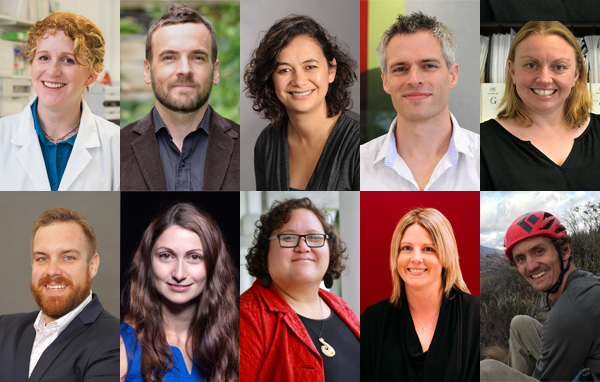News
Published 4 October 20182018 Rutherford Discovery Fellowships to accelerate research careers announced

Ten early- to mid-career researchers have been awarded Rutherford Discovery Fellowships that support them to accelerate their research careers in New Zealand.
The awarded Fellows’ research programme spans a wide variety of interesting questions such as how best to manage whale stranding by determining factors that influence animal stress and survival, understanding potential longer-term social impacts of traumatic brain injuries (concussions), exploring how to support refugee integration in Aotearoa, and the development of minimally-invasive methods to detect gastrointestinal disorders.
The fellowships seek to attract, retain and grow New Zealand’s most talented early- to mid-career researchers and support their career development by helping them to establish a track record for future research leadership. A few of the new fellows will be returning from overseas to take up these fellowships.
Chief Executive of Royal Society Te Apārangi, Dr Andrew Cleland FRSNZ, says it will be exciting to watch the career paths of these researchers, who are in disciplines as diverse as philosophy, bioengineering, ecology and astrophysics.
“The Fellowships support them to explore the area they are most interested in and potentially build a team around them. It allows them to build on their skills and networks to establish themselves as world class research leaders based in New Zealand.
“While selected entirely on merit, it is pleasing to see that this year six of the 10 fellowships have been awarded to females.”
The Rutherford Discovery Fellowships receive government funding of $8 million per annum, and award $800,000 over five years to each Research Fellow. There are at least 50 Rutherford Discovery Fellows supported at any one time.
Royal Society Te Apārangi manages the fellowships programme on behalf of government.
For 2018, the Rutherford Discovery Fellowship recipients are:
- Dr Timothy Angeli, University of Auckland, for research entitled: Electrophysiologically-based diagnostics and therapeutics for gastrointestinal disorders: bridging the gap from engineering benchtop to clinical bedside
- Dr Sarah Diermeier, University of Otago, for research entitled: Long non-coding RNAs as new drivers of tumour progression
- Dr Ceridwen Fraser, University of Otago, for research entitled: The race for new space: disentangling the processes that shape global patterns of biodiversity
- Associate Professor Jay Marlowe, University of Auckland, for research entitled: Dislocation in an age of connection: Mapping refugee settlement trajectories within an increasingly mobile world
- Dr Jonathan Squire, University of Otago, for research entitled: Cosmic turbulence, microinstabilities, and the magnetisation of the Universe
- Dr Karen Stockin, Massey University, for research entitled: The application of artificial intelligence (AI), innovative technologies and evolutionary theory to address the conservation-welfare nexus during human-wildlife interactions
- Dr Lisa Te Morenga, Victoria University of Wellington, for research entitled: Naku te rourou, nau te rourou, ka oranga ai te iwi (With my food basket and your food basket the people will be well)
- Associate Professor Alice Theadom, Auckland University of Technology, for research entitled: Developing a biopsychosocial model of mild traumatic brain injury
- Dr Jonathan Tonkin, University of Canterbury, for research entitled: Rethinking ecological networks in changing environments
- Dr Krushil Watene, Massey University, for research entitled: Intergenerational justice: Obligations and decision-making
More information on the new Rutherford Discovery Fellows is available at: royalsociety.org.nz/RDFs including statistics about the funding round.
